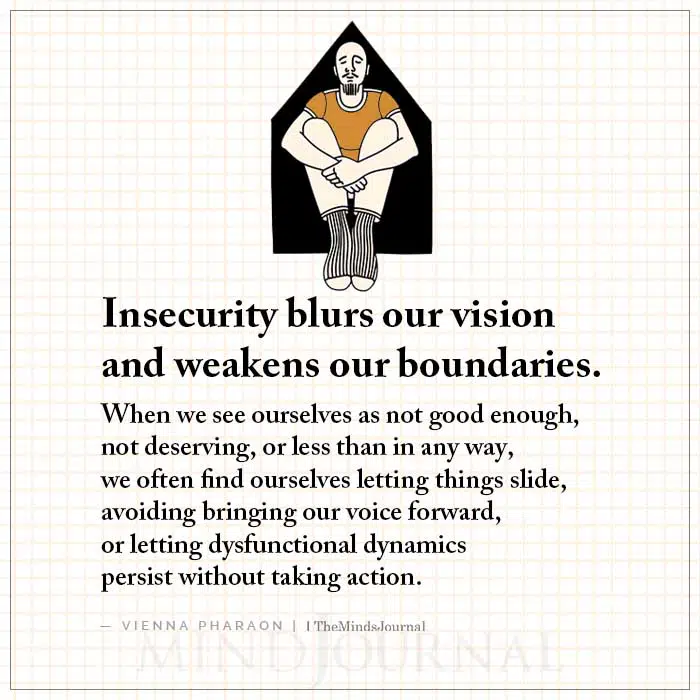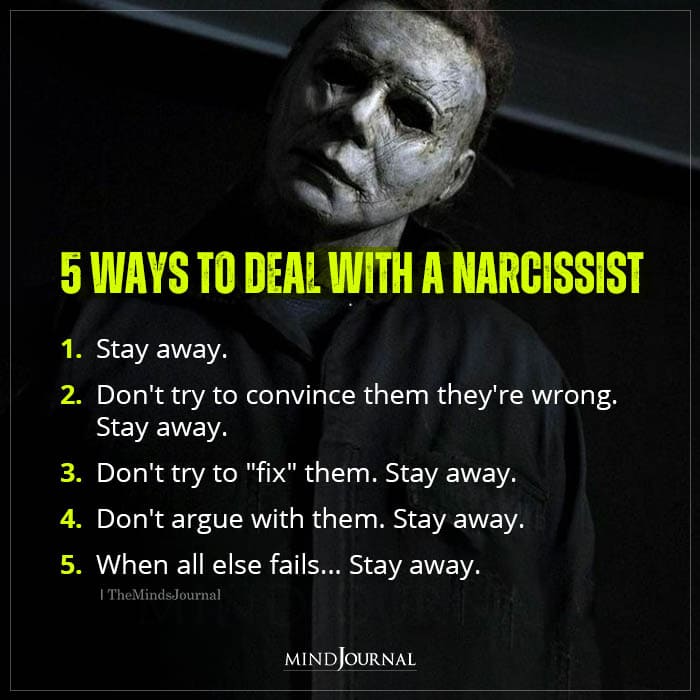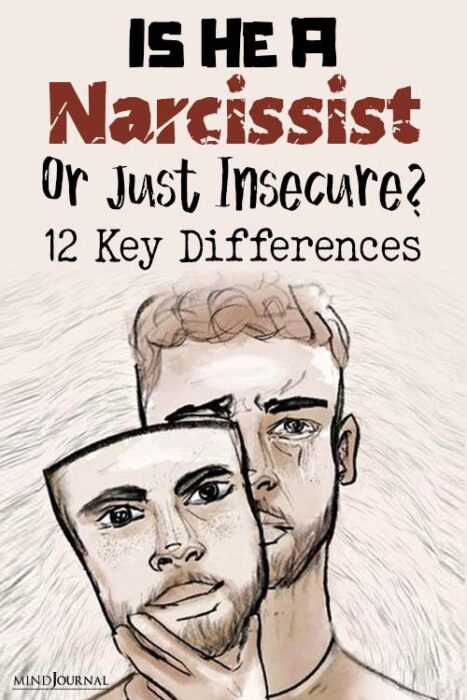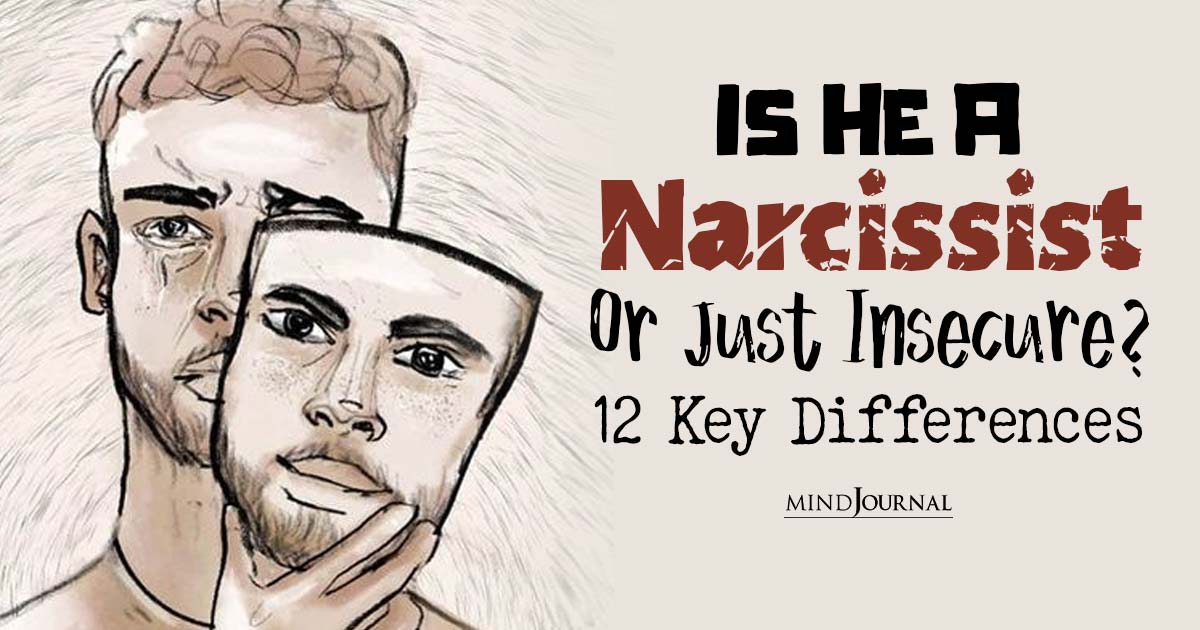Do you feel like your boyfriend or husband is someone who seems overly confident and self-absorbed, yet surprisingly sensitive and unsure of themselves at times? Is he someone who always wants to spend time with you, but doesn’t really throw a huge tantrum when you go out with your friends without him? Well, this might make you ask yourself that “Is he a narcissist or just insecure?”
Is he someone who seems to have an inflated sense of self-importance or constantly seeks validation and reassurance? It can be difficult to identify whether someone is a narcissist or is struggling with insecurity, but understanding the differences between these two conditions can help you navigate your relationship more effectively.
So, if you have ever asked yourself the question “Is he a narcissist or just insecure?”, you have come to the right place. In this article, we’ll take a closer look at narcissism and insecurity, and provide some tips on how to identify and navigate a relationship with someone who may be struggling with these conditions.
Whether you’re trying to understand your current partner or looking to avoid future relationship pitfalls, or even trying to find the answer to the question “are narcissists insecure?” this guide will provide valuable insights into the world of narcissism and insecurity.
Related: 9 Best Books On Narcissism You Cannot Afford To Miss
Is He A Narcissist Or Just Insecure?
What Is Narcissism?
Narcissism is a personality disorder that is characterized by an inflated sense of self-importance, a lack of empathy for others, and a constant need for admiration and attention.
Narcissists often believe that they are special and unique, and that they are entitled to special treatment and privileges. They may also exhibit grandiose behaviour, such as bragging about achievements or accomplishments, and may have a tendency to manipulate or exploit others to get their way.
Narcissistic individuals may appear charming and confident on the surface, but underneath they are often insecure and vulnerable. They may feel threatened by criticism or rejection, and may lash out in response to perceived threats to their ego.
Examples Of Narcissism
- Jane and Tom have been in a relationship for several months. Jane is starting to notice that Tom always wants to be the center of attention. He interrupts her when she’s speaking and talks over her. When they go out with friends, he tells long stories about his accomplishments and doesn’t seem interested in anyone else’s experiences. When Jane tries to bring up something that’s important to her, Tom dismisses it and changes the subject back to himself.
- Alex and Sarah are coworkers. Sarah has been working hard on a project for several weeks, and when it’s finally completed, Alex takes credit for it in front of their boss. When Sarah confronts Alex about this, he becomes defensive and accuses her of being jealous of his success. He refuses to apologize and instead focuses on how his actions were justified because he deserved recognition for the project.
- Mark and Rachel have been friends for years. Mark is always asking Rachel for favors, but he never offers to do anything for her in return. When Rachel brings this up, Mark becomes angry and tells her that she should be grateful for everything he’s done for her. He accuses her of being selfish and ungrateful, and refuses to acknowledge that he might be taking advantage of her generosity.
In each of these examples, one person is exhibiting narcissistic behavior by putting their own needs and desires above those of the other person. They may lack empathy for others and seek constant attention and validation. This can lead to strained relationships and difficulty building trust and intimacy with others.
So, tell me, is he a narcissist or just insecure?
Symptoms of narcissism
Some of the most common symptoms of narcissism are as follows:
- Inflated sense of self-importance
- Constant need for admiration and attention
- Lack of empathy for others
- Sense of entitlement
- Preoccupation with fantasies of success, power, or beauty
- Exploitative behavior towards others
- Difficulty handling criticism or rejection
- Belief in their uniqueness and superiority
- Arrogant and condescending attitude
- Manipulative and controlling behavior
- Envious of others’ success or achievements
- Takes advantage of others to achieve their goals
- Expects special treatment and favors
- Difficulty maintaining healthy relationships
- Difficulty acknowledging their mistakes or flaws
So, is he a narcissist or just insecure? Now that we have covered narcissism, let’s talk about insecurity.

The Connection Between Self-Esteem And Narcissism
The term “narcissist” often conjures an image of an individual with an inflated ego and an excessive sense of self-importance. But, are narcissists insecure? Of course they are!
Beneath the surface of grandiosity and self-assurance lies a complex relationship between narcissism and low self-esteem. Contrary to popular belief, many narcissists actually suffer from deep-rooted feelings of inadequacy and insecurity.
Insecure narcissists exhibit a pattern of behaviour that includes an overwhelming need for admiration, an exaggerated sense of self-importance, and a lack of empathy for others. They often appear self-assured, even grandiose, as they strive to project an image of superiority and invulnerability.
However, this façade is merely a defence mechanism to mask their underlying feelings of inadequacy and vulnerability.
Narcissists with low self-esteem exist on a spectrum known as “vulnerable narcissism.” Beneath their apparent self-confidence lies a fragile self-image and an intense fear of rejection or criticism.
They seek external validation to bolster their sense of self-worth, constantly craving admiration and praise from others. A perceived slight or any challenge to their ego can trigger a defensive response, as they struggle to protect their fragile self-esteem.
The combination of narcissism and low self-esteem can create challenging dynamics in interpersonal relationships. On the one hand, narcissists’ need for constant attention and admiration may make them appear charismatic and alluring initially. However, over time, their self-centred behaviour and lack of empathy can strain relationships, as they prioritize their own needs over those of others.
In close relationships, vulnerable narcissists may display excessive jealousy or possessiveness, fearing that their partner will abandon or criticize them. They may become overly dependent on their partner for reassurance and validation, which can be emotionally draining and suffocating for the other person.
Moreover, vulnerable narcissists may have difficulty maintaining long-lasting friendships or professional relationships, as their need for constant affirmation can alienate others over time. They may also struggle to handle criticism or failure, as it threatens their carefully constructed self-image.
Now you know the answer to the question of “Are narcissists insecure?”.
Related: Covert Vs Grandiose Narcissist Archetypes: The Yin And Yang Of Narcissism
What Is Insecurity?
Insecurity is a general feeling of inadequacy or self-doubt. An insecure husband or boyfriend may feel that they are not good enough, smart enough, or attractive enough, and may constantly seek validation and reassurance from you and other.
He may also be hypersensitive to criticism or rejection, and may feel anxious or depressed in social situations.
Insecurity can be caused by a variety of factors, including childhood experiences of trauma or neglect, a lack of social support, or a history of failed relationships. In some cases, insecurity may be related to a specific area of life, such as body image or career success.
Examples Of Insecurity
- Mike and Lisa are in a relationship. Mike is constantly seeking reassurance from Lisa, asking her if she still loves him and if she’s happy with him. He becomes upset if she spends time with friends or family without him, and worries that she will leave him for someone else. He often apologizes for things that aren’t his fault, and struggles to assert himself in the relationship.
- John and Mary are co-workers. John is hesitant to share his ideas in team meetings, worrying that they won’t be good enough. He avoids taking on new projects out of fear of failure, and struggles to make decisions without seeking reassurance from his boss. He often downplays his accomplishments and minimizes his contributions to the team.
- Sarah and David are friends. David is always seeking validation from Sarah, asking her if he likes what he is wearing or if he’s being annoying. He worries that other people don’t like him, and becomes upset if he perceives that someone is upset with him. He often apologizes for things that aren’t his fault, and avoids conflict at all costs.
Symptoms Of Insecurity
Some of the most common symptoms of insecurity are as follows:
- Constant need for validation and reassurance
- Feeling inadequate or not good enough
- Fear of rejection or criticism
- Excessive self-doubt and self-criticism
- Avoiding situations that may trigger feelings of inadequacy
- People-pleasing behaviour to gain approval
- Comparing oneself to others and feeling inferior
- Difficulty accepting compliments or praise
- Being overly sensitive to perceived slights or negative feedback
- Avoiding risks or challenges due to fear of failure
- Seeking validation through achievements or material possessions
- Feeling anxious or uncomfortable in social situations
- Putting others’ needs before their own to avoid conflict
- Difficulty asserting themselves and setting boundaries
- Feeling like an imposter, doubting their own abilities
The Connection Between Self-Esteem And Insecurity
Self-esteem and insecurity are two sides of the same coin, deeply intertwined and shaping how individuals perceive themselves and their worth. While self-esteem reflects one’s overall evaluation of their value and abilities, insecurity manifests as self-doubt and feelings of inadequacy.
Self-esteem and insecurity often interact in a cyclical manner. For example, someone with low self-esteem may experience heightened feelings of insecurity when faced with challenges or criticism.
Conversely, someone who struggles with insecurity may find it difficult to develop and maintain healthy self-esteem, as self-doubt undermines their ability to recognize their strengths and accomplishments.
Moreover, external factors, such as social comparison and unrealistic societal standards, can exacerbate both self-esteem and insecurity. Constantly comparing oneself to others or striving for unattainable ideals can lead to feelings of inadequacy, further eroding self-esteem.

Narcissism vs. Insecurity: How to Tell the Difference
If you have ever wondered “Is he a narcissist or just insecure?”, then these differences might help you understand better. While narcissism and insecurity can lead to similar behaviours, there are several key differences between the two conditions.
1. Sense of Self-Importance.
Narcissists tend to have an inflated sense of self-importance and may be preoccupied with fantasies of power, success, and attractiveness.
In contrast, insecure people may feel that they are not good enough and may be preoccupied with their flaws and shortcomings.
2. Empathy.
Is he a narcissist or just insecure?
Narcissists often lack empathy for others and may be manipulative or exploitative.
Insecure men, on the other hand, may be hypersensitive to the needs and feelings of others, and may go out of their way to avoid conflict or rejection.
3. Behaviour.
Narcissists may be more likely to engage in grandiose behaviour, such as bragging or exaggerating their achievements.
Insecure folks may be more likely to engage in self-deprecating behaviour, such as downplaying their accomplishments or avoiding attention.
4. Openness to Change.
Narcissists may be more resistant to change and may not recognize their own flaws or weaknesses.
On the other hand, if someone is insecure, they may be more open to feedback and may work harder to improve themselves.
5. Self-Image.
Is he a narcissist or just insecure?
Narcissists have an overly positive and idealized self-image, believing they are superior to others in every aspect. They may exaggerate their achievements and talents to maintain this self-perception.
Insecure individuals have a negative self-image and struggle to see their strengths and positive attributes.
Related: 8 Signs You Are Being Abused By A Somatic Narcissist
6. Reactions to Ceeeriticism.
Narcissists react defensively or aggressively to criticism, as it challenges their grandiose self-image. They may dismiss or belittle the criticizer.
Insecure people, however, may take criticism to heart and feel deeply hurt or rejected. They might internalize criticism, leading to further feelings of inadequacy.
7. Relationships.
Narcissists often seek relationships that feed their need for admiration and validation. They may use others to boost their ego and maintain their sense of superiority.
People who are insecure may seek constant reassurance and validation from their relationships, which can lead to clinginess or dependency.
8. Introspection.
Narcissists tend to avoid self-reflection and introspection, as it might uncover their vulnerabilities and flaws. They prefer to project a flawless image to the world.
Insecure individuals, on the other hand, may engage in excessive self-analysis and rumination about their perceived inadequacies, leading to anxiety and self-doubt.
9. Motivations.
Is he a narcissist or just insecure?
Narcissists are primarily motivated by the need for self-enhancement and self-aggrandizement. Their actions are driven by a desire for power, admiration, and control.
Insecure individuals, on the other hand, are motivated by a fear of rejection and failure. They may avoid risks and challenges to protect themselves from potential negative outcomes.
10. Attention-Seeking.
Narcissists actively seek attention and validation from others, often dominating conversations and making everything about themselves.
If your boyfriend is insecure you will notice that he will always try to seek attention, but his approach might be more subtle and passive, hoping for others to notice and reassure them.
11. Response to Success and Failure.
Narcissists may react to success with arrogance and an exaggerated sense of accomplishment. Failure, however, can be deeply threatening to their self-esteem, leading to defensiveness or blaming others.
Insecure folks may struggle to fully acknowledge and celebrate their successes, fearing they were just lucky, while failure may confirm their self-doubts and inadequacies.
12. Long-Term Outlook.
Is he a narcissist or just insecure?
Narcissists may struggle to maintain long-term relationships due to their self-centred behaviour and lack of empathy.
Insecure people might have a hard time forming and sustaining relationships as well, but their motivations are rooted more in fear of rejection and not feeling worthy of love and connection.

Are Narcissists Insecure?
So, are narcissists insecure? What does insecure narcissism look like? Let’s find out!
While it may seem like narcissists are confident and self-assured, they are actually deeply insecure individuals. Narcissism is often a defence mechanism used to protect an individual from feelings of vulnerability and inadequacy.
Narcissists may have experienced significant trauma or emotional pain in their past, and they use their inflated sense of self-importance to shield themselves from further hurt.
At the core of narcissism is a deep-seated fear of rejection and abandonment. Narcissists often struggle with feelings of shame and self-doubt, and they may be hyper-vigilant to any perceived threats to their ego.
They seek constant validation and attention from others in order to bolster their fragile self-esteem, and they may become defensive or angry if they feel criticized or rejected.
Insecure narcissism means they may also engage in manipulative or exploitative behaviour as a way of maintaining control over their environment.
They may see other people as objects to be used for their own purposes, rather than as individuals with their own thoughts and feelings. This can lead to strained relationships and difficulty building trust and intimacy with others.
It’s important to note that not all individuals who exhibit narcissistic behaviour are necessarily struggling with insecurity. Narcissism is a complex condition that requires a formal diagnosis from a mental health professional.
However, research has shown that there is a strong link between insecure narcissism and underlying feelings of inadequacy and vulnerability.
One theory about the development of insecure narcissism suggests that it may be a response to early childhood experiences of neglect or emotional abuse. Children who do not receive consistent love and attention from their caregivers may develop a deep-seated fear of rejection and abandonment, which can manifest as narcissistic behaviour in adulthood.
Another theory suggests that insecure narcissism may be a response to feelings of powerlessness or helplessness. Individuals who feel that they have no control over their environment may use their inflated sense of self-importance as a way of asserting control and dominance over others.
Regardless of the underlying causes of insecure narcissism, it’s important to recognize that individuals struggling with this condition are often deeply wounded and in need of support and compassion.
While their behaviour may be hurtful or manipulative, it’s important to approach them with empathy and a willingness to understand their underlying motivations.
If you suspect that you or someone you know may be struggling with insecure narcissism or narcissism in general, it’s important to seek the advice of a qualified mental health professional.
With the right guidance and support, individuals with narcissism can learn to develop healthier patterns of behaviour and build stronger relationships with others.
Related: Is It Me Or Them? 3 Signs Someone Is Projecting Insecurities Onto You
How To Deal With Narcissists And Insecure Individuals?
If you are wondering “Is he a narcissist or just insecure“, and thinking of how to deal with him, then these strategies might be of help.
For Narcissists
When dealing with narcissists, it is important to set clear boundaries and avoid getting drawn into their manipulative behaviour.
Are narcissists insecure? Yes, of course, they are, and that’s why they may try to control or exploit others, so it is important to stand up for yourself and assert your own needs and wants.
It is also important to avoid playing into their need for attention and validation, as this can reinforce their narcissistic behaviour.

For Insecure People
When dealing with insecure people, it is important to be supportive and understanding. Insecure people may be hypersensitive to criticism or rejection, so it is important to offer constructive feedback in a compassionate and non-judgmental way.
It is also important to offer reassurance and validation, as this can help to build their self-esteem and confidence.
In both cases, it is important to recognize that change may be difficult and may take time. Narcissists may be resistant to change and may not recognize the need for it, while insecure individuals may struggle with self-doubt and low self-esteem.
However, with patience and support, both narcissists and insecure individuals can learn to develop healthier patterns of behaviour and build stronger relationships with others.
Conclusion
So, is he a narcissist or just insecure?
While narcissism and insecurity may seem similar on the surface, they represent two distinct psychological conditions with different underlying causes and motivations.
Narcissism is characterized by an inflated sense of self-importance, a lack of empathy for others, and a constant need for admiration and attention, while insecurity is a general feeling of inadequacy or self-doubt.
By understanding these differences and learning how to identify and respond to each condition, we can build stronger, more fulfilling relationships with others and promote greater emotional well-being for all.
If you or someone you know is struggling with narcissism (or insecure narcissism) or insecurity, it may be helpful to seek the support of a mental health professional.
Related: 15 Warning Signs You Are Dating An Insecure Man
A trained therapist can help individuals to identify and address the underlying issues that are contributing to their negative patterns of behaviour, and can provide tools and strategies for building healthier relationships and improving overall well-being.
Remember, it is never too late to seek help and support for mental health concerns, and taking the first step towards healing is a sign of strength and courage.









Leave a Reply
You must be logged in to post a comment.